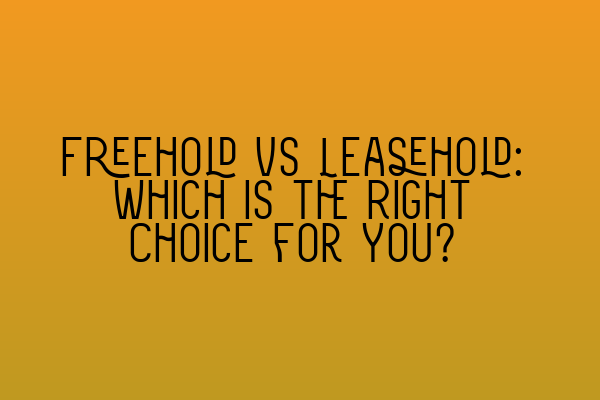Freehold vs Leasehold: Which is the Right Choice for You?
When it comes to purchasing a property, one of the key decisions you’ll need to make is whether to opt for a freehold or leasehold property. Each type of ownership has its pros and cons, and understanding the differences between them can help you make an informed decision that aligns with your needs and preferences.
In this article, we’ll delve into the intricacies of freehold and leasehold ownership, exploring the key characteristics, rights, and responsibilities associated with each. By the end, you’ll have a clearer understanding of which option may be the right choice for you.
Freehold Ownership:
Let’s begin by examining freehold ownership. When you purchase a freehold property, you own both the building and the land it sits on outright. You have complete control over your property and are not subject to any lease or rent payments.
One of the primary advantages of freehold ownership is the sense of security it provides. Since you own the property outright, you have the freedom to modify, renovate, or sell it as you wish, without seeking permission from any external parties. Additionally, freehold ownership typically offers greater control over the management and maintenance of the property.
Moreover, freehold properties generally appreciate in value over time, making them a valuable asset. You also have the option to pass on the property to future generations as part of your estate planning.
However, it’s important to note that freehold ownership also comes with its share of responsibilities. As a freehold property owner, you are solely responsible for all upkeep and maintenance costs, including repairs and renovations. Additionally, any legal disputes or issues related to the property are your responsibility to handle.
Leasehold Ownership:
Now, let’s turn our attention to leasehold ownership. In this arrangement, you purchase the right to occupy and use the property for a specified period, as outlined in a lease agreement. The land, however, is owned by a separate entity known as the landlord or freeholder.
The primary advantage of leasehold ownership is the reduced upfront cost. Leasehold properties are typically less expensive to purchase compared to freehold properties. You also have the flexibility to lease the property for a specific period, which can be advantageous if you’re uncertain about long-term commitments.
Another benefit of leasehold ownership is that the responsibility for the maintenance and repair costs often falls on the landlord or freeholder. This can save you time, effort, and money when it comes to property upkeep.
However, leasehold ownership also comes with certain limitations and considerations. The lease agreement may contain specific restrictions on what you can do with the property, such as prohibiting certain modifications or requiring permission for alterations. Furthermore, the leasehold period will eventually expire, and the property will revert to the landlord or freeholder unless you negotiate an extension or renewal.
It’s important to thoroughly review the terms and conditions of the lease agreement before committing to a leasehold property. Factors such as ground rent, service charges, and potential lease extensions or renewals should all be considered and carefully evaluated.
So, Which is the Right Choice for You?
Determining whether freehold or leasehold ownership is the right choice for you depends on various factors, including your financial situation, long-term plans, and personal preferences.
If you value complete control and ownership of your property, as well as the potential to pass it on as an inheritance, freehold ownership may be the better option. On the other hand, if you’re looking for a more affordable upfront cost, less responsibility for maintenance, and greater flexibility in terms of lease duration, leasehold ownership might be more suitable.
Each individual’s circumstances and priorities are unique, and it’s crucial to carefully evaluate the advantages, disadvantages, and legal implications of both options before making a decision. Consulting with a qualified solicitor who specializes in property law can provide you with expert guidance tailored to your specific needs.
At SQE Property Law & Land Law, our team of experienced solicitors is well-versed in all aspects of property law. We can provide you with comprehensive advice and support to help you navigate the complexities of freehold and leasehold ownership and make an informed decision.
Interested in learning more about property law? Check out our related articles that delve deeper into various topics:
– Understanding Contractual Capacity: Rights and Limitations
– Interactive SQE Mock Tests for Contract Law: Test Your Knowledge
– Join Our SQE Contract Law Webinars: Expert Insights and Guidance
– Contract Law Reforms: An Analysis of Recent Changes
– Parties in a Contract: Rights and Responsibilities
Feel free to explore these articles to enhance your understanding of property law and its intricacies.
In conclusion, the choice between freehold and leasehold ownership ultimately depends on your individual needs, preferences, and long-term plans. By evaluating the advantages and disadvantages of each option and seeking professional guidance, you can make an informed decision that best aligns with your circumstances.
